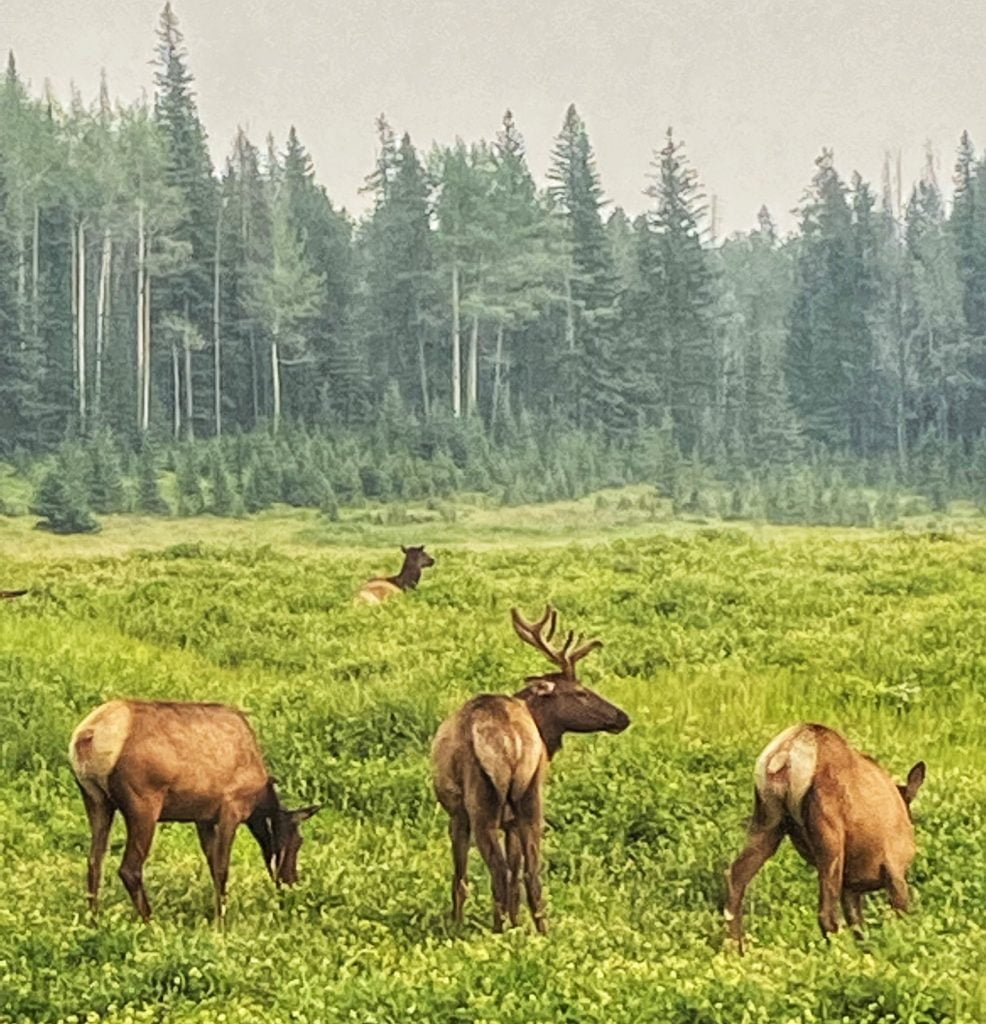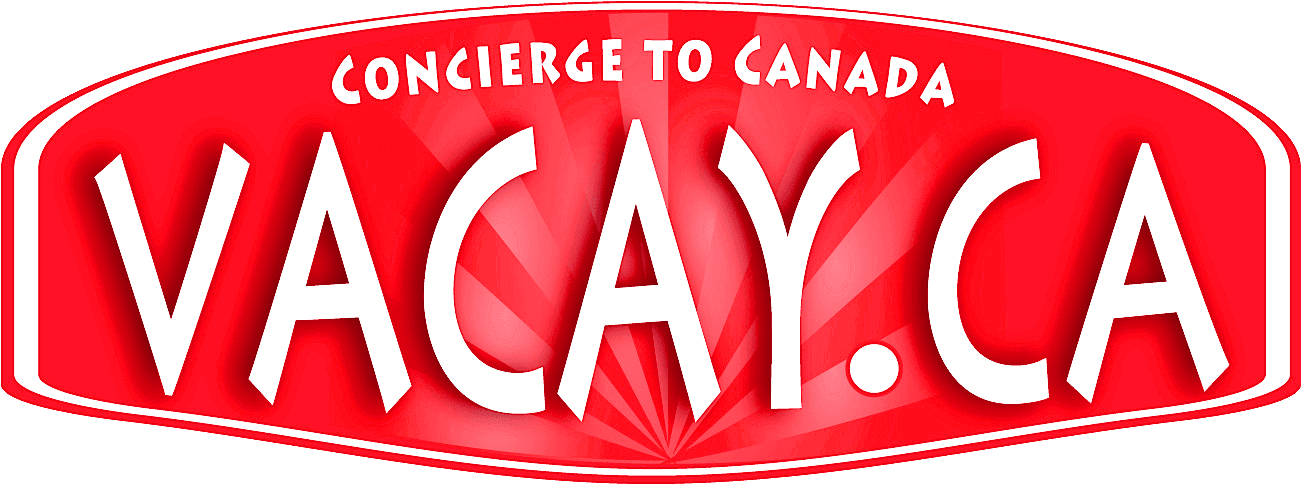
Young Gabriel Brijbassi is riveted during his first canoe trip. Accompanied by his parents, he toured the Bow River on a group paddle with the Banff Canoe Club. (Adrian Brijbassi photo for Vacay.ca)
A few minutes into his first canoe ride, my 3-year-old son was not blinking. I looked down to see how he was reacting as he sat huddled between my hip’s and my wife’s. From his wide-eyed look I knew the world and its possibilities had been blown open for him.
We were on the Banff Canoe Club‘s Big Canoe Tour, a 90-minute experience that slips along the Bow River far beneath the Rocky Mountain peaks that make the Alberta destination among the most mesmerizing places on earth.
Gabriel, though, was focused on the reeds and shore, the thrush of water and the yellow paddles closer to his nose. He was nervous, I could tell from his silence and the attentive way he surveyed, measuring up the situation. Trusting of his parents, he never indicated he was anything but game for the thrill of the raft, spying over the frame to the curious bubbles that the paddles formed in the water and keeping an eye out for the elusive critters in the woods and branches. The “big canoe” is a Voyager, reminiscent of those used by fur traders in the 19th century and the dugout canoes of Indigenous groups who travelled the waterways for food and territory.

Author Adrian Brijbassi teaches his 3-year-old son, Gabriel, how to handle an oar during a canoe trek on Banff’s Bow River. (DeNon Brijbassi photo for Vacay.ca)
It can fit more than a dozen tourists and one strong guide who commands the boat’s anchor position while a Canadian flag trails behind. Everyone who is able paddles, but the guide does most of the work, powering through the water with strokes that splatter the Bow. The river in many ways is the key artery of southern Alberta, carrying water from gorgeous Bow Lake south of Jasper, down to Calgary and connecting with the powerful South Saskatchewan River that flows through the Canadian prairies and into Hudson Bay.
While we didn’t have much luck spotting wildlife, the signs of their presence — beaver dams, eagle and osprey nests, clipped bushes of tall grass that elk had trampled on, and ravaged berry bushes that bears had torn through for food — were frequent and provided more opportunities for the guide to impart education about the ecosystem. While I am accustomed to hard, driving paddles in a two-person canoe or solo kayak, the Voyager boat was a chance to introduce Gabriel to an activity I hope he will embrace. I paddled when the guide needed assistance but mostly took photographs and helped Gabriel get the handle of his kid’s oar the canoe club provided, along with sanitized life jackets.

A Canadian Pacific freight train knives through the Rocky Mountain landscape of Banff National Park. Wildfires in July 2021 created a fierce sky above the tracks and the Bow River alongside it. (Adrian Brijbassi photo for Vacay.ca)
The trip took place during the July wildfires that caused much worry and calamity in Western Canada. Smoke from the conflagrations that blazed to the north and west of Banff had settled into the area, causing a hazy, apocalyptic-looking shroud in the sky and around the mountains. It was stark and concerning to adults who could recognize climate change’s impacts right in front of us. But for Gabriel it was all new and riveting and joyful, like much of the other experiences we participated in on the trip.
Banff Wildlife Safari Wows and Teaches Kids

A family of elk grazes in Banff National Park. The evening wildlife ride with Discover Banff Tours provides the chance to see and learn about the animals and their ecosystem. (DeNon Brijbassi photo for Vacay.ca)
An evening wildlife safari with Discover Banff Tours was the best opportunity we had to see animals in their natural habitat. The tour takes place on a bus and guests are asked to wear masks throughout the two-hour ride (though that may change based on provincial guidance on COVID-19 mandates). The national park’s population of ungulates — elk, deer, bighorn sheep, and moose — can often be spotted in the fields beyond the road side. We saw a herd of elk grazing at dusk and the bus stopped to open its front door, allowing photographers a chance to step one at a time to capture the animals.
While we didn’t see a bear, the tour guide knew where to look. Most importantly, for kids, the activity, like the canoe ride, was filled with knowledge. Although he is only a toddler, Gabriel is a good listener and eager to figure out the world. The tour is a far better experience for his education than journeying in his stuffy car seat with his parents jabbering in front.

Gabriel Brijbassi spots a mule deer on an evening safari tour through Banff National Park. (Adrian Brijbassi photo for Vacay.ca)
His interest had the effect of making me see these soft adventure experiences anew. Far from the adrenaline-pumping tours I often gear up to try, these guided activities focus on revealing a broader world view to children and potentially creating an emotional connection to the earth, hopefully encouraging them to become stewards of it.

Vacay.ca Co-Founder Adrian Brijbassi completes the Big Canoe Tour with his wife, DeNon, and son, Gabriel, during a smoky July night in Banff. Wildfires in Alberta and eastern British Columbia spread into the national park, causing the skies to look fiery and stark. (Photo courtesy of Banff Canoe Club)
By the end of our five days of adventure, Gabriel had grown up a wee bit. For me, his maturity is captured in a family photograph taken after the Big Canoe ride. Standing tall between his parents, with sky ablaze behind him and oar in hand, he is clearly proud of his achievement, of braving the wobbly experience, participating in the paddle, and walking out with enough memorable thrills to fill up his three-foot body — a good preparation for the next time he is ready to explore the Canadian rivers and lochs.
MORE ABOUT VISITING BANFF AND LAKE LOUISE
Where to Stay: Canalta Lodge (545 Banff Avenue) is a family-friendly three-star hotel with rooms that feature full kitchens, an attractive and economical amenity for guests who prefer to be self-contained. Hot tubs and lots of outdoor seating provide a resort feel to the property. Best of all for kids is the free s’mores kits with a bag of marshmallows and chocolate-covered cookies, and steel roasting rods, that are available each night for toasting over the fire pits.
Getting There: A shortage of rental cars in Canada has caused some distress for travellers across the country. Book your vehicle well in advance of your trip. Calgary International Airport is the gateway to Banff, with the national park a 90-minute drive away. British Columbia residents often drive to the jewel of Alberta, with the trip taking about nine hours from Vancouver.
An attractive option is booking a shuttle from Calgary to Banff, allowing you to go car-free during your visit to the national park. Banff and Lake Louise Tourism lists the shuttle options on its website. They include the On-It Regional Transit bus that costs just $10 per person to travel from Calgary to Banff and has numerous departures daily.
Park Passes: A day pass to visit Banff National Park is required. Visit the Parks Canada website to see what fee best applies to your trip. Also consider an annual Parks Discovery Pass that allows for entry into 80 national parks and historic sites.
Tour Experiences:
Big Canoe Tour: The Banff Canoe Club has multiple guided group tours a day. The Big Canoe Tour costs $59 per adult and $29 per children 6-12 in age (free for kids up to age 6). Sanitized life jackets and paddles are loaned for the ride. An orientation precedes the tour and includes educational tidbits about the animals and their habitat.
Evening Wildlife Safari Tour: Discover Banff Tours has three evening safari tours departing hourly beginning at 5:30 p.m. The tour costs $58 per adult and $33 for children 6-12 in age (free for kids up to age 6).

A bighorn sheep surveys the landscape atop Sulphur Mountain, which is accessed via the Banff Gondola. Many sheep roam the mountain, giving visitors a memorable wildlife-viewing encounter. (Adrian Brijbassi photo for Vacay.ca)
Wildlife Tip: One of the most likely spots to see bighorn sheep is at the top of Sulphur Mountain where the Banff Gondola disembarks. The sheep love to lick the salt on the rocks and wood of the building.
COVID-19 Guidelines: Alberta is aggressively easing COVID-19 restrictions. You can read its public-health policies and guidelines as your visit approaches.
MORE COVERAGE
Rediscovering the Allure of Banff and Lake Louise: With international tourists absent because of the pandemic, Canadians are enjoying the open space of the beautiful national park and its region (by Vacay.ca Editor Claudia Laroye).
Banff’s Natural Wonders Still Mesmerize: Why the national park’s magnificence continues to thrill return visitors (by Vacay.ca Editor Petti Fong).
COMING SOON
Vacay.ca Managing Editor Adrian Brijbassi will be producing additional articles on Banff’s culinary scene, tourism additions during the pandemic, and more, while Deputy Editor Claudia Laroye’s article on wellness retreats in the area will be published in September.
Vacay.ca is focusing coverage on Banff and Lake Louise in summer and fall of 2021 as it is a destination fundamental to so much happening in tourism in the country, including adaptation to environmental challenges, resurgence from the pandemic, and renewed awareness of domestic tourism.
Note: Banff & Lake Louise Tourism and Travel Alberta provided travel costs for author Adrian Brijbassi and his family. Neither organization reviewed the article before it was published.







